Killing Politics Softly
IF 1.3
4区 社会学
Q3 INTERNATIONAL RELATIONS
引用次数: 3
Abstract
Early propaganda studies in authoritarian countries argue that state media works to legitimize the regime through indoctrination and persuasion. However, recent scholarship shows that citizens in authoritarian countries—in states like China, Syria, Russia, and Kazakhstan—can be unconvinced by state propaganda. How, then, does the way in which citizens experience unconvincing propaganda shape their political beliefs? How might unpersuasive propaganda contribute to authoritarian stability? Given the lack of alternative theories of propaganda, this article proposes a new hypothesis based on a reception study that interviewed 24 Russian citizens from Krasnoiarsk Krai after they watched items from Russian state television. The article theorizes that unconvincing state propaganda in Russia can reinforce a preexisting cynical attitude toward politics—an attitude that makes the collective action necessary for bottom-up reform hard to contemplate, let alone organize in an authoritarian context.温和地扼杀政治
早期对专制国家的宣传研究认为,国家媒体通过灌输和说服来使政权合法化。然而,最近的学术研究表明,专制国家的公民——比如中国、叙利亚、俄罗斯和哈萨克斯坦——可能不相信政府的宣传。那么,公民所经历的缺乏说服力的宣传是如何塑造他们的政治信仰的呢?缺乏说服力的宣传如何有助于专制的稳定?鉴于缺乏替代的宣传理论,本文提出了一个基于接受研究的新假设,该研究采访了24名来自克拉斯诺亚尔斯克地区的俄罗斯公民,他们观看了俄罗斯国家电视台的节目。这篇文章的理论是,在俄罗斯,缺乏说服力的国家宣传会强化先前存在的对政治的愤世嫉俗态度——这种态度使得自下而上的改革所需的集体行动难以想象,更不用说在威权主义背景下组织起来了。
本文章由计算机程序翻译,如有差异,请以英文原文为准。
求助全文
约1分钟内获得全文
求助全文
来源期刊

Communist and Post-Communist Studies
Multiple-
CiteScore
1.90
自引率
0.00%
发文量
23
期刊介绍:
Communist and Post-Communist Studies is an international journal covering all communist and post-communist states and communist movements, including both their domestic policies and their international relations. It is focused on the analysis of historical as well as current developments in the communist and post-communist world, including ideology, economy and society. It also aims to provide comparative foci on a given subject by inviting comments of a comparative character from scholars specializing in the same subject matter but in different countries.
 求助内容:
求助内容: 应助结果提醒方式:
应助结果提醒方式:


